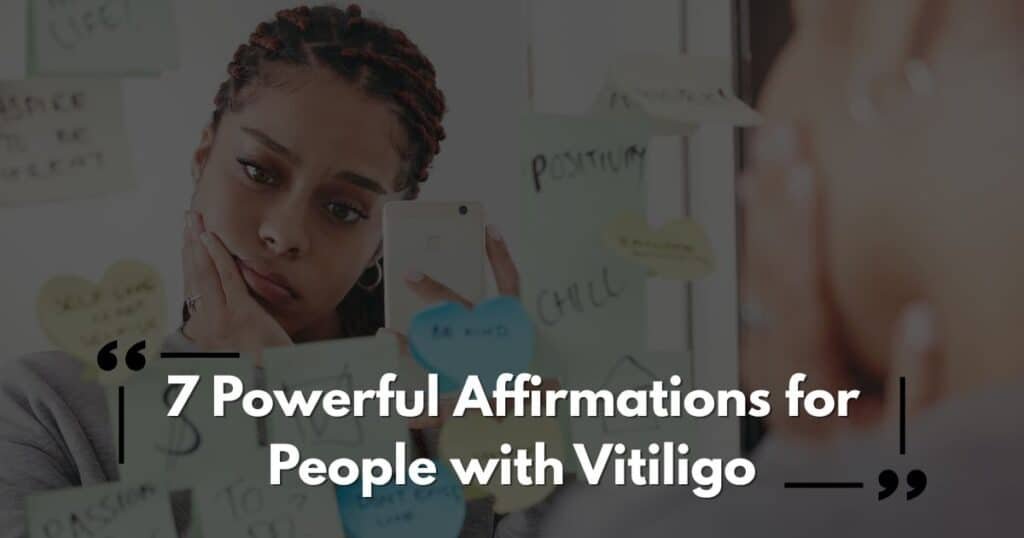Vitiligo is a long-term skin condition where patches of skin lose their pigment. These patches appear lighter or white, and while it’s not contagious or physically painful, it can deeply affect how someone sees themselves.
The Emotional Impact of Vitiligo: People with vitiligo often deal with stares, questions, or even discrimination. This can lead to anxiety, low self-esteem, and depression. But here’s the truth — your skin doesn’t define your worth.
Why Positive Affirmations Matter: Our thoughts shape our feelings and actions. When you repeat positive, empowering words to yourself, it can transform your inner dialogue. That’s where affirmations come in — they’re like mental push-ups for your confidence.
Understanding Affirmations
What Are Affirmations?
Affirmations are positive statements that help challenge and overcome self-sabotaging thoughts. They’re like planting seeds of self-love and watching them grow with time and care.
How Do Affirmations Work?
When you consistently speak kindly to yourself, your brain begins to believe it. This shifts your mindset from negative to empowering, helping you feel stronger, braver, and more beautiful.
Science Behind Self-Talk and Skin Conditions
Studies show that stress and negative emotions can worsen skin conditions. Positive self-talk lowers stress hormones, which can benefit your mental health and even help your skin heal better.
How Affirmations Help People with Vitiligo
Boosting Self-Esteem
Saying affirmations every day can rebuild your self-worth. They remind you that you are valuable — not despite your vitiligo, but including it.
Enhancing Emotional Resilience
Life throws challenges your way, and vitiligo may be one of them. Affirmations help you bounce back from judgment, stress, or internal doubt with more grace.
Reducing Anxiety and Shame
Many people with vitiligo feel the need to hide. Affirmations give you the courage to embrace visibility — to be seen just as you are, proudly.
Also Read: Top 10 Common Myths About Vitiligo
7 Powerful Affirmations to Embrace Your Beauty
Affirmation #1: “My skin tells a unique and beautiful story.”
Meaning and Impact
This reminds you that your vitiligo is part of your life journey — not a flaw. It’s your signature, your personal artwork.
When and How to Use It
Say it when you look in the mirror in the morning. Own your story and say it loud.
Affirmation #2: “I am more than my skin. I am strong, radiant, and worthy.”
Meaning and Impact
This is your daily power boost. Your value isn’t tied to appearance. You’re amazing, period.
When and How to Use It
Repeat before social events or interviews to build inner confidence.
Affirmation #3: “Every mark on my skin is a symbol of my courage.”
Meaning and Impact
You face the world every day with strength. This affirmation honors your bravery.
When and How to Use It
Use it when someone makes you feel “different.” Say it. Believe it. Feel your power.
Affirmation #4: “I radiate confidence and self-love every day.”
Meaning and Impact
This helps rewire your brain to carry confidence into every situation.
When and How to Use It
Pair this with smiling at your reflection. It shifts your energy instantly.
Affirmation #5: “I accept myself completely, inside and out.”
Meaning and Impact
Self-acceptance is freedom. It’s about loving yourself without conditions.
When and How to Use It
Repeat during moments of self-doubt or insecurity.
Affirmation #6: “I deserve love, respect, and kindness.”
Meaning and Impact
This reminds you that love and respect aren’t earned by appearance — they’re your right.
When and How to Use It
Use it after hurtful experiences or as a daily self-love mantra.
Affirmation #7: “I choose to focus on what makes me amazing.”
Meaning and Impact
This encourages you to shift focus from flaws to strengths. It’s empowerment in action.
When and How to Use It
Write this on your mirror or journal it daily.
Also Read: How Vitiligo Affects Mental Health: Coping Tips and Resources
Tips to Make Affirmations More Effective
Speak with Emotion and Intent
Don’t just say them — feel them. Let your voice carry belief and meaning.
Repeat Daily (Especially in the Mirror)
Mirror work boosts impact. Seeing yourself while affirming adds power to the process.
Write Them Down or Journal
Writing reinforces your affirmations. It’s a great habit for self-growth.
Pair Them with Deep Breathing or Meditation
This helps calm your mind and makes the words sink deeper into your heart.
Additional Healing Practices to Complement Affirmations
Therapy or Support Groups
Talking to a mental health professional or joining a support group for people with vitiligo can bring healing and connection.
Skincare Routines That Make You Feel Good
Caring for your skin can feel empowering. Use products that make you feel pampered and comfortable.
Following Inspiring People with Vitiligo
Celebrities and influencers with vitiligo like Winnie Harlow or Lee Thomas are powerful reminders that beauty comes in many shades.
Conclusion
Vitiligo may change the color of your skin, but it can never dull your light. These affirmations are tools — small, powerful sentences that, when used consistently, build a stronger, prouder, more joyful you. It’s not about pretending everything’s perfect — it’s about choosing love over shame, and empowerment over fear.
Repeat these affirmations. Write them. Believe them. And remember: you are radiant, unique, and beautifully human.
FAQs
1. Can affirmations really change how I feel about my vitiligo?
Yes! With regular practice, affirmations can shift your mindset and help you develop greater self-love and confidence.
2. How long should I practice affirmations to see a change?
Start with 21 days. Consistency is key — most people notice changes within a month.
3. Should I create my own affirmations?
Absolutely. Personal affirmations are even more powerful. Just ensure they are positive, present tense, and empowering.
4. Are affirmations a replacement for therapy?
No. Affirmations are a self-help tool, but they don’t replace professional mental health support when needed.
5. Can affirmations help children with vitiligo too?
Definitely. Children can benefit from hearing and repeating kind, encouraging words about their skin and identity.



